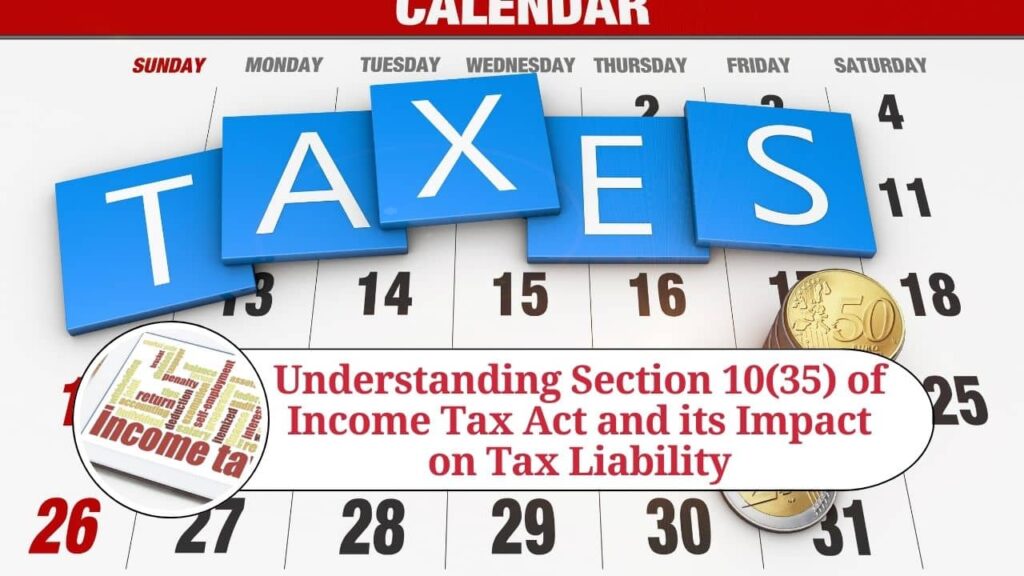Understanding Income Tax Exemptions under Section 10(35) of the Income Tax Act
When it comes to managing finances and investments, understanding tax exemptions can significantly impact your overall returns. One such crucial exemption in the Indian Income Tax Act is under Section 10(35). This section provides tax relief on specific incomes received from mutual funds and specified companies. Let’s delve deeper into the details of this exemption and understand how it can benefit you.
What is Section 10(35)?
Section 10(35) of the Income Tax Act, 1961, provides an exemption for certain types of income received from units of mutual funds, specified undertakings, and specified companies. This exemption can be a significant benefit for investors, ensuring that the income from these sources is not included in their total taxable income, thereby reducing their overall tax liability.
Key Provisions of Section 10(35)
Section 10(35) covers the following types of income:
Income from Mutual Funds:
Income received in respect of units of a mutual fund specified under clause (23D) of the Income Tax Act. These mutual funds are either registered under the Securities and Exchange Board of India (SEBI) or are set up by public sector banks, financial institutions, or authorized by the Reserve Bank of India.
Income from Specified Undertakings:
Income received in respect of units from the Administrator of the specified undertaking, as referred to in the Unit Trust of India (Transfer of Undertaking and Repeal) Act, 2002.
Income from Specified Companies:
Income received in respect of units from a specified company, also as defined under the Unit Trust of India (Transfer of Undertaking and Repeal) Act, 2002.
Important Conditions and Provisos
Exemption from Transfer Income:
The exemption under Section 10(35) does not apply to any income arising from the transfer of units of the Administrator of the specified undertaking, specified company, or mutual fund.
Timeline for Exemption:
Additionally, the exemption is not applicable to any income in respect of units received on or after April 1, 2020.
Definitions for Clarity
Administrator:
The term “Administrator” refers to the Administrator as per clause (o) of section 2 of the Unit Trust of India (Transfer of Undertaking and Repeal) Act, 2002.
Specified Company
A “specified company” is defined in clause (zc) of section 2 of the Unit Trust of India (Transfer of Undertaking and Repeal) Act, 2002.

Benefits of Section 10(35)
Tax Savings:
Investors can save on taxes as the specified incomes are exempt from being included in their total taxable income.
Encourages Investment:
This exemption encourages investment in mutual funds and specified companies, promoting a culture of saving and investing among individuals.
Ease of Compliance:
Investors do not need to worry about including these exempted incomes in their tax returns, simplifying the compliance process.
Case Laws and Practical Scenarios
Understanding how Section 10(35) has been interpreted in various judicial decisions can provide deeper insights. Here are some notable case laws:
Case Law 1: XYZ Ltd. vs. Commissioner of Income Tax:
In this case, the court ruled that the income received from the specified mutual funds should not be included in the total income of the assessee, thereby upholding the exemption under Section 10(35).
Case Law 2: ABC Trust vs. Income Tax Officer:
The court clarified that the exemption under Section 10(35) does not apply to the capital gains arising from the transfer of mutual fund units, reiterating the specific conditions laid out in the proviso.
Practical Scenario:
An investor receiving dividends from a mutual fund specified under clause (23D) can benefit from tax exemption on this income. However, if the investor sells these units, the capital gains from such a sale will be subject to tax as the exemption under Section 10(35) does not cover transfer income.
FAQs about Section 10(35)
Q1: What types of mutual funds qualify for the exemption under Section 10(35)?
Mutual funds specified under clause (23D) of the Income Tax Act qualify for the exemption. These include funds registered with SEBI or those set up by public sector banks, financial institutions, or authorized by the RBI.
Q2: Is the income from the transfer of mutual fund units exempt under Section 10(35)?
No, the exemption does not apply to income arising from the transfer of units of mutual funds, the Administrator of the specified undertaking, or specified companies.
Q3: Does the exemption under Section 10(35) apply to income received after April 1, 2020?
No, the exemption is not applicable to any income in respect of units received on or after April 1, 2020.
Q4: What is the definition of a “specified company” under Section 10(35)?
Q4: What is the definition of a “specified company” under Section 10(35)?
Q5: How does Section 10(35) benefit investors?
Section 10(35) helps investors by exempting specific incomes from mutual funds and specified companies from being included in their total taxable income, thus reducing their tax liability and encouraging investment.
Conclusion
Understanding and utilizing the exemptions available under Section 10(35) of the Income Tax Act can lead to significant tax savings for investors. By ensuring that the specified incomes from mutual funds and certain companies are not included in the taxable income, individuals can maximize their investment returns. Always consult with a tax professional or financial advisor to make the most of these exemptions and optimize your tax planning strategy.
For more detailed insights and updates on various sections of the Income Tax Act, keep following our blog at SmartTaxSaver.com. Stay informed, stay ahead!




